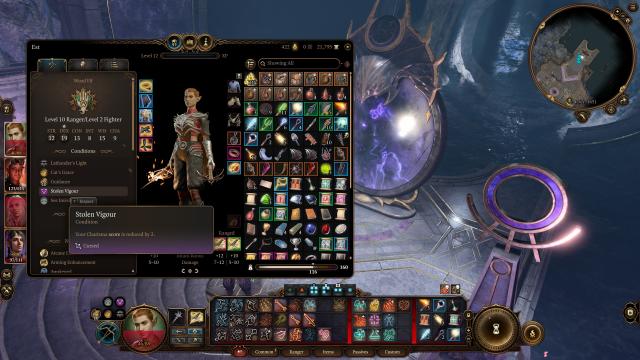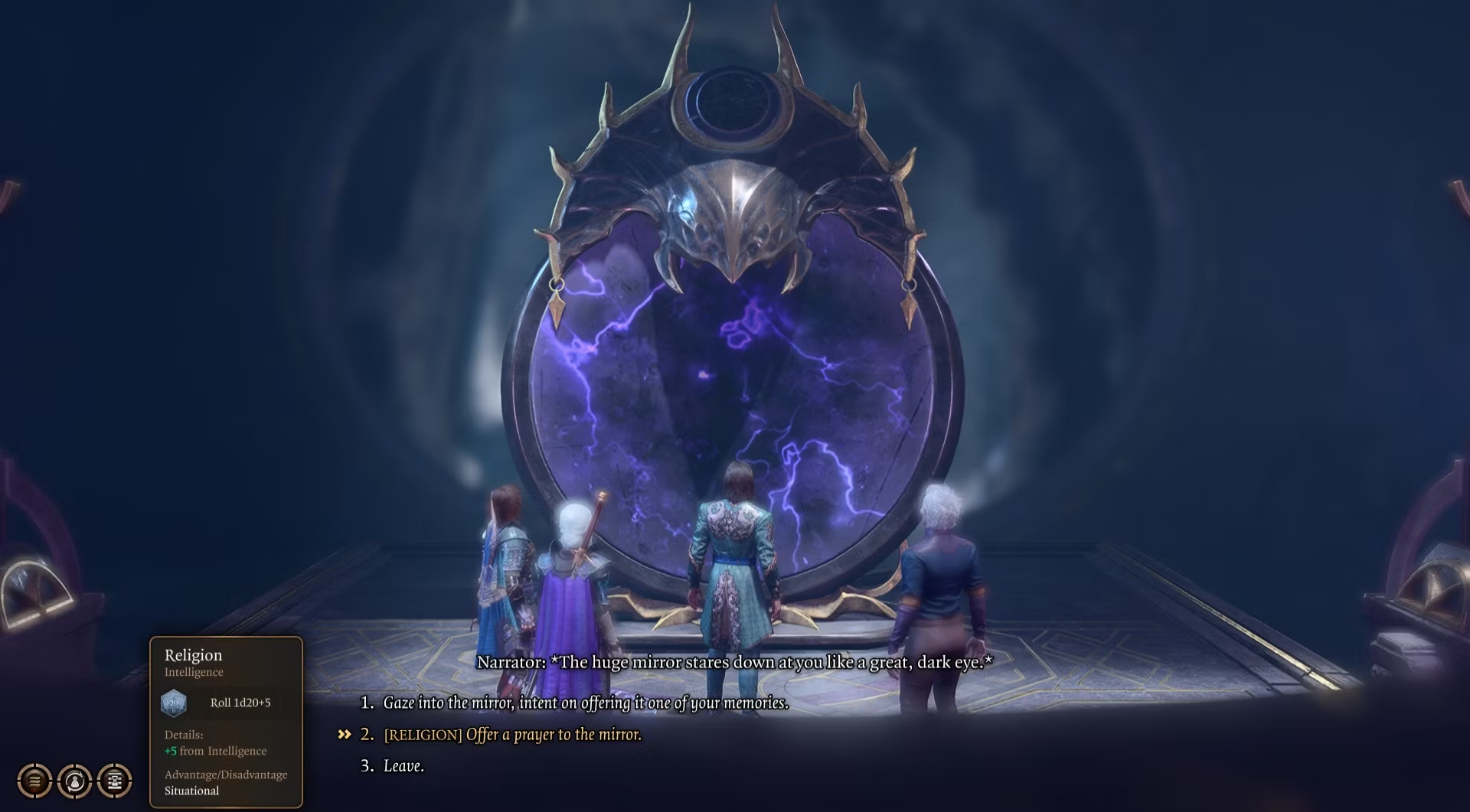Introduction
In the expansive world of Baldur’s Gate 3 (BG3), players are frequently met with decisions that shape their character’s journey and interactions within the world. One particularly interesting aspect is the Mirror of Loss, a mystical object that can offer both power and peril. This article will delve into what the Mirror of Loss is, how it works, and the potential consequences of interacting with it, offering players a detailed guide to navigating this feature in BG3.
What Is the Mirror of Loss?
The Mirror of Loss is an ancient and enigmatic relic found in Baldur’s Gate 3. Much like the game’s other complex decisions and morally ambiguous choices, the Mirror offers players an opportunity to gain power at a significant personal cost. By interacting with the mirror, players can engage in a ritual that offers the potential for stat boosts or other benefits. However, this gain comes with a corresponding loss, hence its name.
The lore surrounding the Mirror of Loss is tied to the broader universe of Faerûn, the fictional world in which BG3 is set. The mirror is said to be a relic of the god Shar, the goddess of darkness and loss, who thrives on people’s sacrifices and grief. Thus, using the Mirror of Loss is not just a practical decision but also a thematic one, drawing the player into the darker aspects of the game’s lore.
How to Find the Mirror of Loss
To locate the Mirror of Loss, players must venture into the depths of Act 2 of the game. It is situated in the Gauntlet of Shar, a dungeon tied to the goddess herself. As players make their way through the challenges within the Gauntlet, they will encounter the mirror in one of its hidden chambers. However, getting to the mirror is not as simple as just walking up to it. It’s protected by puzzles and combat challenges that test the player’s wit and strength.
One of the key aspects of reaching the mirror is having a character who is either proficient in Religion or has a deep understanding of the lore tied to Shar. This knowledge can help navigate the puzzles that guard the mirror, as well as make the interaction more meaningful.
Interacting with the Mirror
When you approach the Mirror of Loss, a series of dialogue and interaction options will unfold. The mirror offers the player the chance to sacrifice a portion of their character’s ability scores in exchange for a boon. The options usually revolve around sacrificing a point in one of the player’s core stats, such as Intelligence, Strength, or Charisma, in exchange for a significant reward, often tied to another stat or ability.
At this point, players are faced with a key decision: Is the gain worth the loss? While sacrificing a point in a critical stat like Intelligence may seem too high a price, the rewards offered can be extremely tempting. This is where the mirror’s complexity truly shines. The player must weigh the long-term impact of permanently lowering one of their ability scores against the immediate benefit.
Some players may choose to make a strategic sacrifice. For example, a character that does not rely on Strength may opt to lose a point in that stat while gaining a more beneficial reward in Dexterity or Wisdom. On the other hand, sacrificing a stat that is critical to your character’s build could have far-reaching consequences, especially in combat or when trying to pass skill checks in the future.
The Risks and Rewards
The interaction with the Mirror of Loss is a high-risk, high-reward scenario. Here’s a breakdown of what you might lose and what you might gain:
Potential Losses:
- Permanent Ability Score Reduction: One of the biggest drawbacks of using the Mirror of Loss is that the reduction in an ability score is permanent. Whether it’s Charisma, Dexterity, or any other stat, once you sacrifice it, that score is permanently lowered unless you find another way to boost it later in the game.
- Character Weakness: Depending on what ability score you sacrifice, you could end up weakening your character in a way that affects future battles, social interactions, or skill checks. For example, losing Intelligence could make spellcasting harder for wizards, while losing Strength might hinder physical fighters.
Potential Rewards:
- Increased Power: The most obvious benefit of using the Mirror of Loss is the increase in another stat. For some characters, this could be a game-changer. Gaining a few extra points in a critical stat like Dexterity or Wisdom could make the difference between life and death in combat or other high-stakes situations.
- Unique Boons: In some cases, the Mirror of Loss offers more than just stat boosts. Players may be able to unlock unique abilities or bonuses that are otherwise inaccessible in the game. These rewards make the risk of sacrificing an ability score more tempting.

Role-Playing Considerations
Beyond the mechanical impact of using the Mirror of Loss, there are significant role-playing implications to consider. Baldur’s Gate 3 is a game that thrives on player choice, and every decision you make helps define your character’s journey and personality. Using the mirror to gain power at the cost of a personal sacrifice ties directly into themes of moral ambiguity, temptation, and the pursuit of strength at any cost.
For players who enjoy deep role-playing, using the Mirror of Loss can be a moment of character development. A character who willingly sacrifices part of themselves for power might take a darker turn in their personality or develop a more cynical outlook. On the other hand, a character who refuses to use the mirror, even when the reward is tempting, could grow in a different way, emphasizing moral integrity or restraint.
Moreover, the mirror’s connection to Shar, the goddess of darkness, ties into the larger story arc for characters like Shadowheart, one of the game’s companions. For players who are following Shadowheart’s personal questline or who are invested in the lore of Shar, the Mirror of Loss offers a way to deepen the connection to these story elements.
Strategies for Using the Mirror of Loss
If you’ve decided to take the plunge and use the Mirror of Loss, here are a few strategies to make the most of it:
- Plan Ahead: Before sacrificing any ability score, consider your character’s build and playstyle. For instance, if your character relies heavily on Intelligence for spellcasting, sacrificing points in Intelligence could hinder your ability to cast higher-level spells. Conversely, if you’re playing a melee fighter, sacrificing Charisma might have minimal impact on your combat effectiveness.
- Maximize the Gain: Look for the rewards that offer the most significant impact for your character. For example, gaining a few points in Dexterity or Constitution could improve your survivability and combat effectiveness, especially if your character already specializes in these areas.
- Monitor the Consequences: After interacting with the mirror, keep a close eye on how the changes affect your gameplay. If you notice that the sacrifice has significantly weakened your character in certain areas, you may need to adjust your strategy or compensate in other ways.
Conclusion
The Mirror of Loss in Baldur’s Gate 3 is a perfect example of how the game blends mechanics with storytelling. It’s not just a tool for boosting your character’s stats; it’s also a symbol of the choices and sacrifices that define your journey through the game. Whether you choose to engage with the mirror and accept its consequences or walk away from the temptation, the experience adds depth to your character’s story and the broader narrative of BG3.
Ultimately, the Mirror of Loss represents a powerful, yet risky, opportunity in Baldur’s Gate 3. It challenges players to think critically about what they are willing to sacrifice for power, and how those choices shape their character’s destiny. Whether you choose to embrace the mirror’s offer or avoid it entirely, the decision will leave a lasting impact on your journey through the game’s intricate world.

